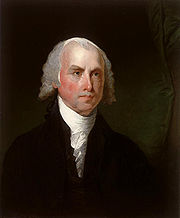
Federalist No. 46
Encyclopedia

James Madison
James Madison, Jr. was an American statesman and political theorist. He was the fourth President of the United States and is hailed as the “Father of the Constitution” for being the primary author of the United States Constitution and at first an opponent of, and then a key author of the United...
, the forty-sixth of the Federalist Papers
Federalist Papers
The Federalist Papers are a series of 85 articles or essays promoting the ratification of the United States Constitution. Seventy-seven of the essays were published serially in The Independent Journal and The New York Packet between October 1787 and August 1788...
. It was published on January 29, 1788 under the pseudonym
Pseudonym
A pseudonym is a name that a person assumes for a particular purpose and that differs from his or her original orthonym...
Publius, the name under which all the Federalist Papers were published. This essay examines the relative strength of the state and federal governments under the proposed United States Constitution
United States Constitution
The Constitution of the United States is the supreme law of the United States of America. It is the framework for the organization of the United States government and for the relationship of the federal government with the states, citizens, and all people within the United States.The first three...
. It is titled, "The Influence of the State and Federal Governments Compared."
Madison stresses that the federal and state governments are two totally different agencies. He articulates that they are separate yet can collaborate together, and that the power lies in the people. The natural attachment of the people will always be to the governments of their respective states, so the federal government must be, in a sense, extraordinarily congenial to the people.
In an effort to further dissuade fears over a national military force, Madison indicates that, at any point, the maximum force that can be brought to bear by the government to enforce its mandates is but a small fraction of the might of an armed citizenry:
Let a regular army, fully equal to the resources of the country, be formed; and let it be entirely at the devotion of the federal government; still it would not be going too far to say, that the State governments, with the people on their side, would be able to repel the danger. The highest number to which, according to the best computation, a standing army can be carried in any country, does not exceed one hundredth part of the whole number of souls; or one twenty-fifth part of the number able to bear arms. This proportion would not yield, in the United States, an army of more than twenty-five or thirty thousand men. To these would be opposed a militia amounting to near half a million of citizens with arms in their hands, officered by men chosen from among themselves, fighting for their common liberties, and united and conducted by governments possessing their affections and confidence. It may well be doubted, whether a militia thus circumstanced could ever be conquered by such a proportion of regular troops.

